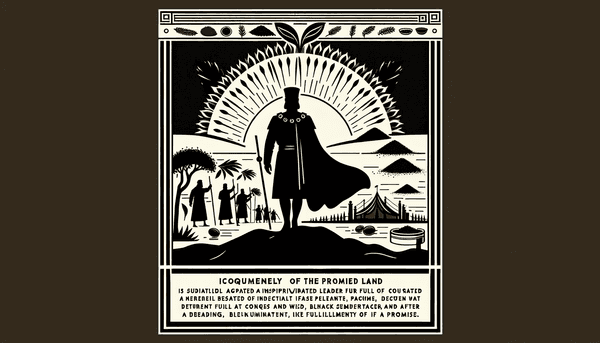The Book of Joshua: Transition of Leadership and Conquest
The Book of Joshua is pivotal, detailing the Israelites' transition from wandering in the desert to establishing a nation under the watchful eye of their new leader, Joshua. As Moses' appointed successor, Joshua takes up the mantle with divine encouragement to be 'strong and courageous' (Deuteronomy 31:7-8). The book chronicles his journey from sending spies into the fortified city of Jericho to the miraculous crossing of the Jordan River, where 'the waters which came down from above stood and rose up upon a heap' (Joshua 3:16), allowing the Israelites to pass on dry ground. The tales of conquest are numerous, including the dramatic fall of Jericho's walls (Joshua 6:20) and the day the sun stood still to allow Israel to claim victory (Joshua 10:12-13). These moments are not merely historical footnotes; they are reminders of faith's power and God's unfailing support to those who uphold His commandments. Joshua's story culminates with the division of Canaan among the twelve tribes (Joshua 11:23) and his final exhortations to the people to remain faithful to the covenant with God, as he himself declares, 'as for me and my house, we will serve the LORD' (Joshua 24:15).
The Role of Rahab and the Spies
Within the walls of Jericho, a seemingly unlikely figure emerges as a pivotal ally to Joshua and the Israelites. Rahab, a prostitute, demonstrates extraordinary faith by sheltering two Hebrew spies. Recognizing the power of the God of Israel, she aids in their mission, asking for salvation for herself and her family. This act of bravery and faith is later rewarded when Jericho falls, and Rahab's life is spared (Joshua 2:1; Joshua 6:17). Her story is a testament to the enduring principle that faith transcends societal boundaries and that God's mercy is available to all who seek it. Rahab's legacy extends beyond the immediate narrative, with her name appearing in the genealogy of Jesus Christ (Matthew 1:5) and her faith commended in the New Testament (Hebrews 11:31), serving as a powerful example of how individual actions can echo through history.
The Mention of Herbs and Spices in the Bible: Black Cumin
The Bible is a rich tapestry that interweaves spiritual teachings with the everyday experiences of its characters, including their use of herbs and spices. Black cumin, known for its healing properties, is mentioned specifically in the prophetic book of Isaiah. There, the process of sowing, reaping, and threshing black cumin is described, illustrating the care with which this herb should be treated (Isaiah 28:25-27). This biblical reference to black cumin underscores the importance of even the smallest elements of creation and their place within God's wisdom. From the anointing oil composed of various spices in Exodus (Exodus 30:23-25) to the aromatic expressions of love in the Song of Solomon (Song of Solomon 4:14), herbs and spices play a symbolic and practical role in the biblical narrative, reflecting the richness of God's provision for His people.
Conclusion
The journey through the Book of Joshua offers more than historical accounts; it invites us to reflect on the nature of leadership and the importance of steadfast faith. Joshua's story, from the crossing of the Jordan to the last days of his life, encapsulates a life lived in service to God and community. Rahab's narrative reminds us that no one is beyond the reach of God's grace, and her inclusion in the lineage of Christ highlights the redemptive possibilities inherent in every act of faith. The mention of black cumin in Isaiah provides a glimpse into the daily lives of biblical figures and the broader message that all of creation is imbued with divine intention. As we close this exploration, we are reminded of the enduring lessons that these ancient texts continue to teach us about the power of faith, the importance of obedience, and the intricate beauty of the world God has created. For further reflection on the divine attributes of God and the nature of human encounters with the divine, consider exploring Understanding Divine Omniscience and Human Reconciliation through Biblical Reflections.






